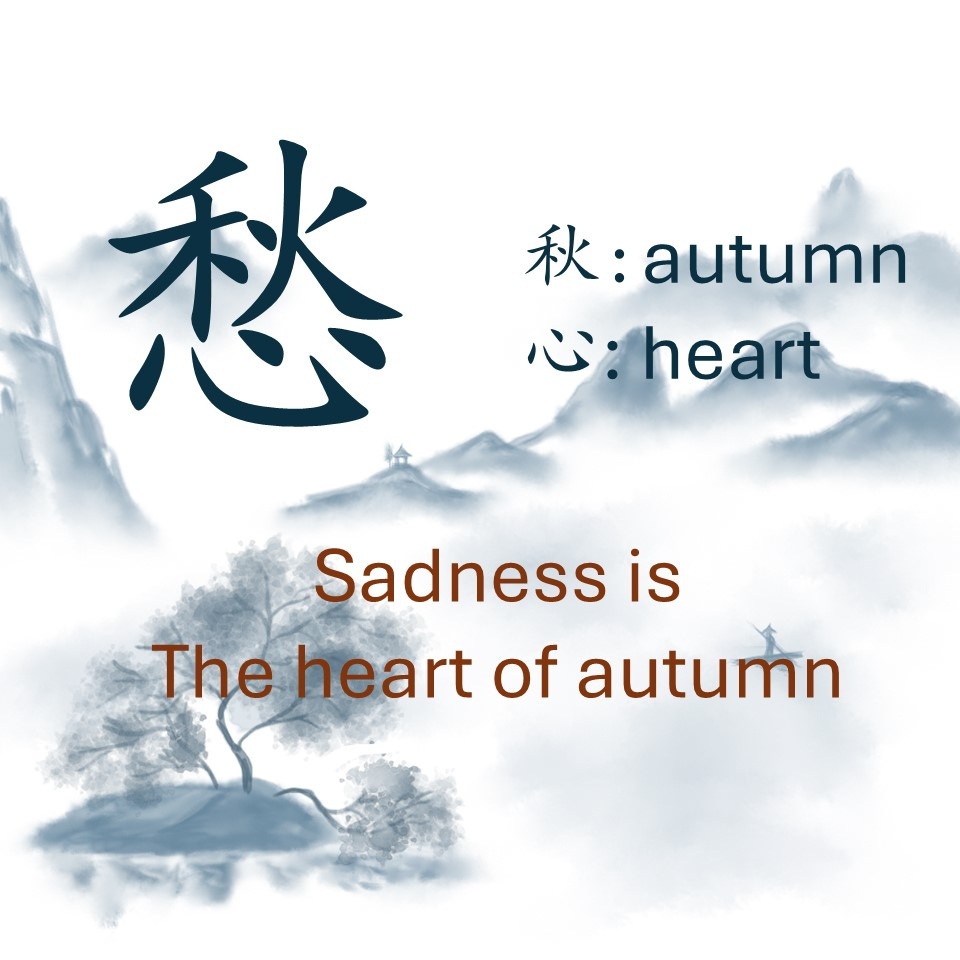The Heart of Autumn: Self as Part of the Ecology
Recommending Fieldwork: feelings as a pathway to the ecological self
Language shapes our perception of reality. Modern language, with English as a primary example, tends to be pragmatic and straightforward, aimed at “arriving at the point”, extracting meanings from the felt-sense and lived experiences, sometimes in a brutal way. With this language as the primary lens, we may experience the world as fragmented, transactional and alienating to the felt-sense of aliveness.
In contrast, ancient languages with indigenous roots, with Chinese as an example, work in an opposite way. Ancient Chinese tends to enfold layers of meaning into simple phrases, enriching the felt-sense and feeling through poetic expression. It also arranges many shades and nuances of felt senses into imagery and metaphors, through which one experiences more of an inter-connected, living world.
Chinese characters carry maps pointing to the mysterious territory of the Tao, which cannot be comprehended through an approach dominated by the rational left brain. Nor can it be fully translated into modern English language. Learning to speak and draw Chinese characters, and contemplating on the meanings they transmit, will activate our feeling heart and intuitive mind, where the essence of the Tao already resides.
This fall, I will be leading a study group in Bellingham, where my home is, to explore the hidden meanings in the Chinese language, as a contemplative way to dive deeper into the cultural context of the Tao. My vision is that this pilot group will generate materials for an online course that can reach a broader audience. If you are interested in such offering in the future, please sign up for our newsletter at ResonancePath.com. You may take a peek at what this course looks like here.
Sadness is the Heart of Autumn and Self is Part of the Ecology
Here is a taste of the hidden meaning in a Chinese character.
The Chinese character for sadness 愁 (pronounced as Chou), has two components. The top component 秋 means autumn. The bottom component 心 means heart. Together this means that sadness is the heart of autumn.
If autumn has a heart, it will feel sad as the leaves wither and blossoms of summer die out. In Chinese poetic culture, thousands and thousands of poems have been dedicated to the exquisite flavors of sadness and the beauty of the heart of autumn.
This character alone implies two things about the philosophy of ancient Chinese culture regarding emotions, selfhood and nature. First, Chinese culture seeks balance and harmony of the multitude of emotions. Without feeling sadness, we can’t feel joy. Life is a dance between polarities, a weave of both/and. Second, emotions do not just belong to individuals. Emotions are part of the energy of the ongoing cycles of seasonal and ecological change. We humans, as part of nature, participate in these cycles of change through feeling our emotions.
Modern culture prioritizes and emphasizes a selfhood that asserts itself onto nature, a self that dominates and controls. In ancient cultures that see human being and nature more as a whole, selfhood is an ecological self, an ongoing dialogue, an interactive process of giving and receiving, influencing and being influenced. Feeling emotions is a critical process to allow the influences of the environment, natural or social, to shape ourselves so we can be part of the ecology.
Recommending Fieldwork, where Feeling is a Pathway towards an Ecological Self
The degradation of mental health is very palpable in our time. Conditioned by the modern culture’s paradigm to assert control, many of us often avoid feeling emotions and interpret our emotions as negative. When we redefine what these emotions are, we may start to develop a more wholesome relationship with emotions where they become a pathway for self-awareness.
Developing a relationship with emotions is a practice and a science. I recommend my partner Joe Shirley’s fieldwork. Joe is the founder of psychotopology, a new science of the feelingmind. This work resonates with the deeper mystery of Taoism, which brought us together as creative and intimate partners.
I have been using fieldwork on myself as well as in my professional work for the last twelve years. I see Joe’s work as an essential piece in shifting the cultural paradigm and re-orienting our self-hood towards a more fluid, flexible and changing part of nature. Joe just published this quick guide that leads you through a mindfulness practice with feelings as a portal.
Fieldwork: a mindfulness process to engage feelings a pathway to the ecological self
Autumn is a season for feeling the the loss of summer, and settling down to prepare for the winter. It is also a time for harvest and celebration. May your heart expand to feel both and dance with the polarities of the season!





